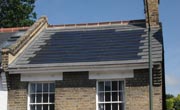Eco towns to receive £60m funding boost
 Four
Four"eco-towns"
due to be built in England are to receive a funding boost of £60m over the next
two years, the government announced yesterday.
The towns, which come from an original shortlist of 12 last year, are
Whitehill-Bordon in Hampshire, St Austell in Cornwall, Rackheath in Norfolk and
North West Bicester in Oxfordshire.
Each is set to receive just over £9m for the next financial year from the
Department for Communities and Local Government (DCLG) and the Homes and
Communities Agency (HCA), with an additional £2 - 6m earmarked for 2010/2011.
These locations could house up to 30,000 people in eco-friendly dwellings in
five years’ time.
The houses will feature water-saving systems, smart meters to monitor energy
use, renewable power and electric car charging points.
The DCLG also said the construction of the new homes would support up to
2,000 local jobs.
Most of the houses will be for sale, with a third of them affordable homes,
although some will remain as permanent eco-show homes.
Housing Minister John Healey said today’s announcement marked the start of
the country’s biggest ever eco-home building programme.
"By 2016 there will be 10,000 new eco-homes in these four pioneering areas.
This means people will be able to experience green living for themselves and see
how it can change their lives and save money," he said.
All the new homes will have to meet at least level 4 of the
Code
for Sustainable Homes, meeting high standards of insulation, water saving
and energy efficiency.
Some will meet the top level (6) in the code - which requires homes to be "
zero-carbon", producing no net emissions from all energy used in the home and
using renewable or low-carbon power.
Overall the new towns, which are expected to be "exemplars" of environmental
development, must be zero-carbon as well as providing a percentage of affordable
homes, large areas of green space and ways to cut car travel.
Shadow housing minister Grant Shapps said the scheme is extraordinary because
all new buildings built after 2016 – even if they are not in eco-towns – must be
built to level 6 of the code for sustainable homes.
"Ministers have said that eco-towns must be built to code level 4, whereas
all regular homes will be code level 6 or zero carbon by 2016," he said.
A spokesperson for DCLG said that it is the infrastructure and design of
eco-towns, as well as their building standards, that will make them zero carbon.
By: Tom Young, BusinessGreen
You can return to the main Market News page, or press the Back button on your browser.

